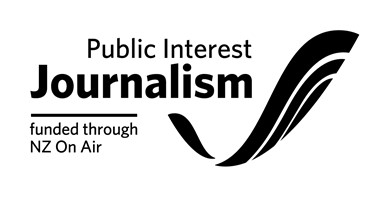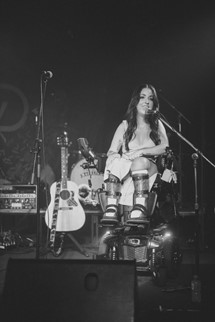The Covid cloud is lifting. The borders are opening and the live-music industry is gearing up for a strong return. Billie Eilish, Guns N’ Roses, The Killers, Dua Lipa and Justin Bieber are all coming to NZ. That’s great news for music fans, but live concerts can still be problematic for people with disabilities.
A childhood friend of mine, Dina Bassile, knows the issue all too well.
“As a person with a disability, I’ve experienced firsthand a lack of access, things like being put on a viewing platform that is located at the back of the show, feeling disconnected.”
Dina, who has a disability and was just a kid when she fell in love with live music. It was clear accessibility was not at the front of organisers' and promoters' minds.
“I grew up around live music. My mum took me to my first show when I was 11 and I fell in love. From there, I went to gigs as often as I could and ended up doing a degree in entertainment management. As a person with a disability, I saw a gap in the industry for accessibility in live music and events. That’s when I started Tibi. I wanted to fill that gap.”
Dina accepts there will always be obstacles for people with disabilities, but there shouldn’t be barriers. That’s why she founded TIBI (Latin: `for you’) in 2018. Dina is using her company to change live music, events and venues for the better. They do this by recognising and removing the barriers faced by people with disabilities.
“Tibi Access is about bringing together the disability community and the arts community. We focus on three main goals. The first is educating the music and arts industry about how to be more inclusive of people with disabilities. This is done through workshops and the lectures that we provide at universities. The second goal is consulting with events, venues, and artists of all sizes. The third is representing and advocating for musicians with disabilities. "
Tibi Access is a massive game-changer and I’m super excited for Dina and her team.
I know from personal experience, that going to music and sporting events has always been a challenge. The list of problems includes a lack of parking, not enough handrails on steep steps and no safe accessible standing areas.
This past March, Tibi Access led their accessible event Groovy Tunes to use it as a teaching platform and opportunity to show industry professionals what the standard should be for every event and how simple it is to make your show accessible. It's about information and education.
“We implemented a range of accessible features like Australian interpreters, braille tickets, a sensory space and an accessible bar to make our event inclusive and a safe space, not just for our punters but for our artists who are living with a disability.”
The event was a massive success with everyone dancing and being ally’s, Dina was touched to see so many communities come together and support one another.
“We want to continue Groove Tunes and make it an annual event. We want to keep making changes in the industry and pave the way for inclusivity in the live music and arts sector.”
Dina agrees that people should consider having more accessible-only events in the future. Accessibility is key to opening doors to a wider audience.
“We go to live music events to create memories, to forget about the world around us and enjoy an hour or two of your favourite performers… People with disabilities are often excluded from those choices because access is not a priority."
For those looking to hold an inclusive event, Dina suggests that you should do your homework to upskill yourself and your team. Opening your doors to the disabled community means you are your doors to an entire demographic that has been excluded in the past.
“Start with educating yourself and your team. Seek professionals for advice, attend workshops and improve your skills. From there, you will learn about the quick and easy wins of accessibility you can implement into your business.”
Tibi access has got venues, events and artists moving to a new beat and that gives me hope that I can attend live music and sports events knowing that it’ll be accessible, inclusive and memorable for all the right reasons.
To conclude - Dina will comment on the importance of accessibility.
“Accessibility means equality and inclusion. It means that people can be independent and feel empowered to access things that allow them to feel free and advocate for choice”.
Photo credit to Juan Castro






